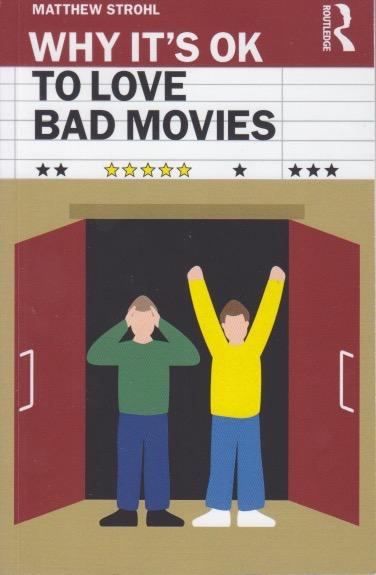
If anybody bothers to follow my movie viewing history, they’ll know that it includes a perhaps disproportionate number of “bad movies.” In fact, I recently added that as a category for my blog posts. In need of some reassurance, I read Matthew Strohl’s Why It’s OK To Love Bad Movies. (As far as I can tell the Why It’s OK series was started by my old boss at Routledge—an inspired idea!) Strohl is a philosopher, but one who admits to, and even advocates for, loving bad movies. This book is fun but it does have a serious philosophical underpinning. I can’t summarize it all here (you need to read the book anyway) but my main takeaways are that ridicule isn’t making the world a better place. Movies that are so bad that they’re good are definitely a reality. There’s a community built around it, but I haven’t had many visits from it in my lonely little corner of the internet here.
Strohl points out that not all bad movies are what he terms “good-bad.” There are certain qualities—aesthetic qualities—that make a bad movie good. And it doesn’t involve watching the movies to make fun of them. One of the films that often tops the list is The Room. When I first saw it I really couldn’t think of anything to write about it on this blog. It was just another bad movie. Now I want to see it again. I do have to say that on my first viewing I didn’t feel like ridiculing. I was more stunned than that. And when I watched Plan 9 from Outer Space—another on the list—I felt inspired to learn more about Ed Wood, its famous director. I’ve since watched a couple more of his movies and I appreciated them. Now I have a better idea of why.
In addition to discussing the biggies, Strohl also takes forays into some collectives: the Twilight series, for example, and the movies of Nicholas Cage. These are both often singled out for ridicule, but this book demonstrates that there’s an artistry to such things. And Bad Movies underscores that not everyone likes the same bad movies. Strohl also makes the salient point that if we only ever watch great movies we’d have no basis for comparison. There’s a lot to like in this little book. One thing it convinced me of (in addition to making me feel a bit better about myself) is that there’s a community out there that I’m missing out on. Good books bring people together instead of dividing into factions. This is a good book.
